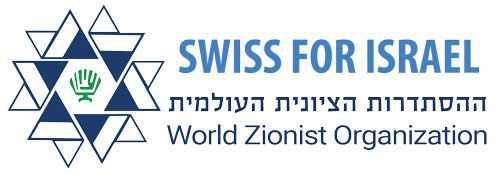Rules for the 2025 Swiss Elections for the 39th Zionist World Congress
Preamble: The Zionist Federation of Switzerland (Schweizerischer Zionistenverband - SZV) in accordance with the Rules for the Election of Delegates to the Zionist Congress (RED) of the World Zionist Organization, organizes Zionist elections to elect the members of the Swiss delegation to the 2025 Zionist World Congress.
1. Eligibility for Registration and Voting
a) Voting Eligibility:
Any natural person to whom the Law of Return of the State of Israel applies and:
- will be at least 18 years old by October 28, 2025,
- is a Swiss citizen or has a permanent residence in Switzerland,
- has not voted in the Israeli Knesset elections held on November 1, 2022, or in any elections held in another country but Switzerland for the 39th Zionist World Congress,
- commits not to vote for the 39th Zionist World Congress in another country but Switzerland or, if general elections are held in Israel before then, not to vote in those elections,
- confirms their Zionist commitment according to the current version of the Jerusalem Program (see: Jerusalem Program).
b) Registration Requirements: A person qualifies as a registered voter if they complete the online registration process during the foreseen timeframe:
- Registration requires full name, address, email address , phone number and date of birth.
- Registration also confirms that the registrant meets all eligibility criteria detailed in point 1a.
- During the registration process, the person needs to physically be in Switzerland.
2. Voter Identification and Verification
- Before voting, every voter’s identity must be verified. The SZV Election Committee (consisting of representatives from all participating organizations and the Swiss Zionist Federation) will check each voter’s registration and can contact registrants for sample checks.
- Before voting, each voter must confirm that they meet all other registration requirements, including that the Law of Return applies to them, adherence to the current Jerusalem Program, non-membership in a non-Jewish religious organization, and that they have not and will not vote in the latest Knesset elections or in elections for the 39th Zionist World Congress in another country.
- To reduce the likelihood of fraud in these elections
- The official voter registry and election webpage will track each device’s IP to identify the device and limit them to no more than 3 (three) individual registrations per IP
- The official voter registry and election webpage will track each device’s VPN to ensure the person is physically in Switzerland.
3. Zionist Shekel
To be eligible to vote, registered voters must pay the Zionist Shekel, which is CHF 5. The payment is done online via the Homepage of the Swiss Zionist Federation for the elections to the WZC 2025.
- Before the vote, the Election Committee will check if the Zionist Shekel has been paid.
- To reduce the likelihood of fraud in these elections, each credit card can pay a maximum of 3 (three) individual Zionist Shekel payments.
4. Data Protection
Before voting, every voter must agree to the data protection and data management statement of the Swiss Zionist Federation (SZV), consenting to the storage and processing of their personal data by the Swiss Zionist Federation (SZV) and, in the event of legal proceedings, by the World Zionist Organization until the end of the 39th Zionist Congress on October 31, 2025.
5. Complaint Handling Any issues related to registration should be directed to the Central Election Committee (vbm@wzo.org.il) or the Swiss Zionist Federation (Dr. Marcel Engelmayer, engelmayer@bluewin.ch). Questions regarding the voting process should be addressed to the Swiss Election Committee, the Head of the Swiss Zionist Federation or the World Zionist Organization.
6. Organizational and Delegate Nomination Eligibility
a) Organizational Eligibility for List Nomination:
Only organizations that are recognized members of the Swiss Zionist Federation (SZV) can automatically submit a list and nominate delegates. Two or more organizations may submit a joint list. The candidate’s name and the nominating organization’s name will be listed on the ballot.
Any organization participating must settle any outstanding membership fees or other dues to SZV by June 10, 2025 (one month before the election).
Parties that did not get a mandate in the last congress, need to present a list of 50 signatures supporting their run (according to the WZO (LINK) (Rule 10.c.3), also see further requirement details for lists).
Individual candidates are also allowed to run, according to the WZO constitution they also need to present 50 signatures (see same further requirements above). Parties that aren't members of the Swiss Zionist Federation and wish to be so, must pay the membership fees established by the SZV's constitution.
b) Conditions for Listing on the Ballot:
Candidates’ information (name, date of birth, address, email, phone number, and nominating organization) and their consent declaration must be submitted to SZV by June 10, 2025.
All candidates must hold a Swiss citizenship or legal Swiss residency and have their main place of residence in Switzerland.
7. Election Process
a) Voter Registration:
- Voter registration will take place online from June 12 to June 26, 2025. Voters must meet all registration conditions and complete the identification and verification process on the official Swiss Zionist Congress Election website.
- All voters can be checked by telephone or mail by the Swiss Area Election Committee to verify that they adhere to the conditions set in § 1 and 3
- After the voter’s check eligible voters are notified that they by e-mail that they can participate and they will receive the necessary documentation
- Persons that do not fulfil the requirements can file an appeal to the Swiss Zionist Federation (SZV) before until July 4th. The decision of the SZV can, if persons disagree, can appeal to the World Zionist Court. This decision is final.
Voting will be held electronically on July 9th and July 10th, 2025.
b) Voting Methods:
- Voters cast one vote for a candidate or list nominated by an eligible organization.
- Seats are allocated using proportional representation:
- Total valid votes are divided by the number of delegate seats (2).
- The candidate with most votes gets the first seat.
- The second seat is allotted in the following way:
For the organization or candidate who got the first seat, the number of votes necessary to get a seat (total votes divided by the number of seats, i.e., total votes divided by 2) will be deducted from their total votes. - After this, whichever party or candidate has the highest remaining votes, gets the second seat (example see in Annex 2).
8. Transparency and Public Access All information about the election results will be publicly available. Personal data as well as individual votes are strictly confidential and will remain so.
9. Campaign Rules
a) Integrity:
- The campaign must be positive and truthful.
- Zero tolerance for voter intimidation, threats, coercion, or misinformation.
- Offering financial incentives or material benefits to voters is strictly prohibited.
b) Publicity:
SZV will ensure communication about the election to the Swiss Jewish community.
Annex 1:
- Prior to elections: Publication of advertisement in Jewish newspaper announcing elections
- June 10, 2025: Nomination of candidates to be submitted to SZV
- June 12, 2025: Opening of registration form for voters
- June 26, 2025: Closing of registration form for voters
- June 27, 2025: Initiation of validation of registered voters
- July 3, 2025: List of eligible voters finalized
- July 4-7, voters that have not been eligible can file an appeal to the SZV
- July 5-6: SZV will decide on eligibility of appeals
- July 4-9, 2025: Voting instructions to be sent to voters
- July 9-10, 2025: Election Days
- July 14, 2025: Publication of Election Results online.
- July 14-18 Publication in a Swiss physical puyblication (depending on exact publication day)
Annex 2:
- Example: 300 people vote and the highest vote is 125 for candidate A.
- Candidate A gets the first seat.
- From Candidate A (if it is a party also List A) 150 votes are now deducted, giving candidate or list A -25 (minus) votes
- The candidate with most of the remaining votes gets the second seat

